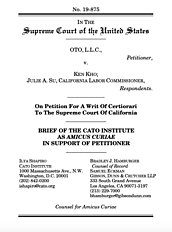Learn more about Cato’s Amicus Briefs Program.
One of the most important practical applications of freedom of contract in present‐day America is arbitration, which allows parties to take disputes out of the court system by agreeing to submit to the judgment of an arbitrator. As an institution, arbitration has grown vital to the business community as a way of planning around the costs, delays, and uncertainties of courtroom litigation. At the same time, arbitration has come under intense attack from opponents.
The U.S. Supreme Court has defended arbitration through its interpretations of the Federal Arbitration Act (“FAA”), which Congress passed in 1925 in an effort to overcome judicial antagonism toward the practice. The FAA requires that courts treat arbitration agreements as favorably as they do other contracts, setting aside these agreements only “upon such grounds as exist at law or equity for the revocation of any contract.” That has led to a series of cycles of evasion in which lower courts have contrived to disallow arbitration clauses by resorting to seemingly neutral contractual principles in a manner that is practically hostile to arbitration and to the FAA. No courts have been more active in trying to bypass arbitration than those of California, which have repeatedly used ostensibly neutral state‐law principles in a manner that failed to provide equal treatment to contracts calling for arbitration.
OTO L.L.C. v. Kho arose when an employee terminated from an auto dealership refused to abide by the arbitration agreement to which both had agreed and instead pursued his employment dispute with the California Labor Commissioner. The arbitration agreement at issue provided the parties with procedural protections similar to what they could expect in an ordinary civil trial, which amounts to more protections that they would have otherwise had in a California administrative hearing. The arbitration would have been overseen by a retired California Superior Court judge.
The California Supreme Court, in a divided opinion, disallowed the agreement. Its decision targets arbitration for special scrutiny, deeming it unconscionable for parties to contract out of the supposed “efficiency” of the dispute resolution system provided by the state’s employment bureaucracy.
The Cato Institute has filed a brief in support of the petition for Supreme Court review by OTO L.L.C. We argue that the high court should review the case and protect Americans’ freedom to contract by correcting the California courts’ continued evasion of the FAA and the Court’s own precedents.

This work is licensed under a Creative Commons Attribution-NonCommercial-ShareAlike 4.0 International License.
